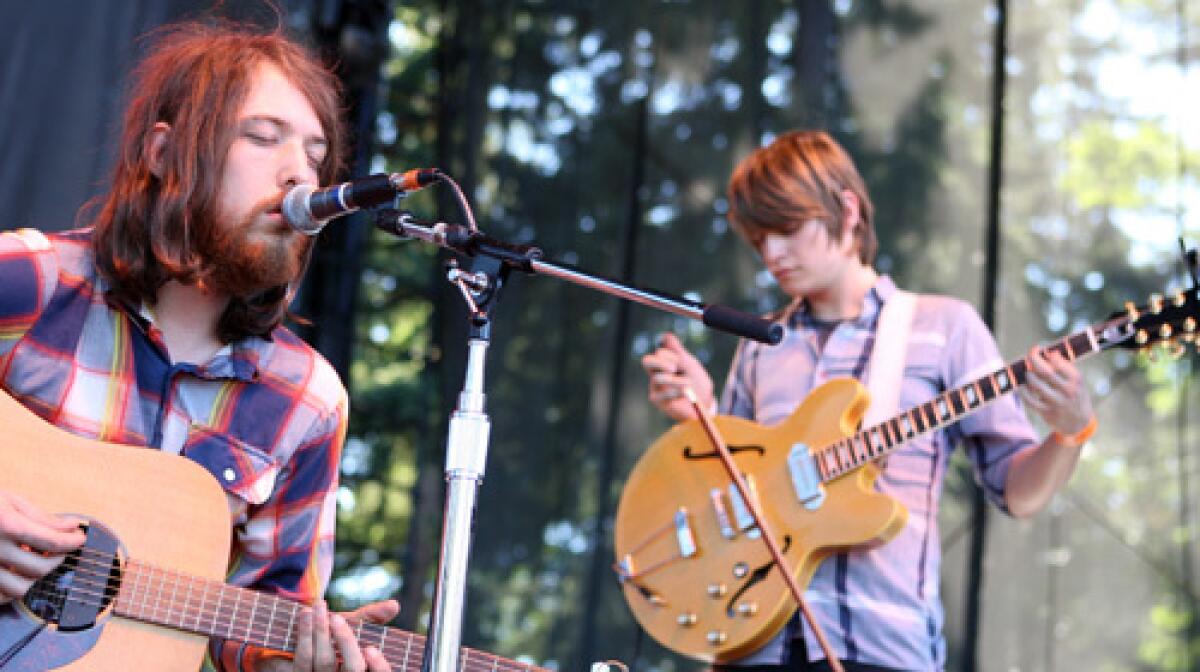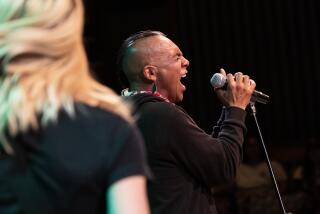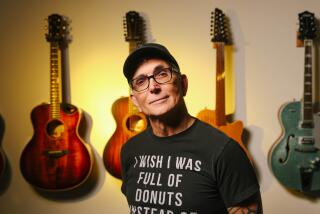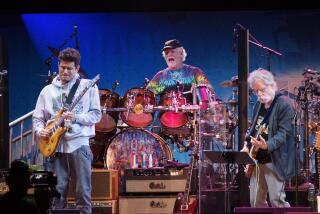Live: Sub Pop’s SP20

REGIONALISM IS dead: That’s one of many extreme ideas floating around pop music circles during these tumultuous times. The theory goes that, as the Internet turns music thoroughly ethereal and links in people from Athens, Ga., to Australia, the need to form community with one’s neighbors -- or to share an artistic vision with them -- will wither.
Yet this weekend at Marymoor Park, in the same Seattle suburb where Microsoft is headquartered, a new idea of cultural regionalism asserted itself. The 13 bands that played in honor of Sub Pop, the record label that defined the link between indie rock and regionalism in the late 1980s and 1990s, showed how a home base can support and unify artists across borders and expose commonalities among locally influenced styles.
The SP20 festival included Les Thugs, a cerebral punk band from France; potty-mouthed popsters the Vaselines, from Scotland; Oxford, England’s jumpy dance rockers Foals; and two groups from New Zealand, tuneful comedians Flight of the Conchords and world music updaters the Ruby Suns (whose founder was raised in Ventura).
Other performers hailed from throughout the 50 states. Their musical approaches were as diverse as the psychedelic guitar tirades of Comets on Fire, the homespun country-rock of Beachwood Sparks and the singer-songwriter musings of Iron & Wine. Yet these artists share more than allegiance to the same record label: During 40-minute sets that flowed smoothly with no diva interruptions, Sub Pop’s finest all showed that punk’s quirkiness and resistance to mainstream norms can translate across the spectrum of rock-influenced music.
Those are also stereotypical qualities of Pacific Northwesterners. In cities like Seattle, the sons and daughters of pioneers evolved into hippies and then into dot-com “creatives,” always clinging to the conviction that life’s better lived through self-reliance and a healthy mistrust of mainstream opinion.
For two decades, Sub Pop has operated on that principle. Its bold black-and-white logo and branding based on the idea of “world domination” mimicked corporate cliches, but the label always signed bands whose primary selling points were integrity and a lack of fuss. Despite some serious financial ups and downs after Nirvana’s stardom brought a fortune to squander, Sub Pop has survived by maintaining that homesteader attitude and looking for it in artists.
The festival as a whole reflected such values. Healthy food was available from the vendors; the local Elysian Brewing Co. had crafted a special brew, Loser Pale Ale, on sale in the beer garden. (“Loser” was the main term used in a typically sarcastic early Sub Pop marketing campaign.) Musicians didn’t hide in their trailers but hung out to watch each other’s sets. Sub Pop employees old and new and other local scene folk hugged and chatted during what one called “the best high school reunion ever.”
Nostalgia was further served by the re-formation of several early Sub Pop signings. Some, like Les Thugs and the Fluid, dated from Sub Pop’s early days. Others, like Beachwood Sparks, made their mark later. But the most excitement greeted the oldest Sub Pop band of all: Green River, whom many consider the wellspring of the Northwest indie-rock sound.
Introducing the group during its fierce, fun, heavy Sunday afternoon set, singer Mark Arm name-checked the even older Northwest punk bands they’d all left to join Green River -- unknown outfits like the Ducky Boys and Deranged Diction. There was that Northwest sarcasm again: Obviously, Arm, bassist Jeff Ament and guitarists Stone Gossard and Steve Turner are better known for their later projects, Mudhoney and Pearl Jam.
Mudhoney already had provided one festival high point Saturday, but Green River outdid its own successor by playing even more aggressively, with serious abandon. Gossard and Ament, fresh from a VH1-sponsored concert honoring the Who in L.A., grinned as they bashed through songs like “Swallow My Pride” and “Ain’t Nothin’ to Do.”
Arm yowled and stormed through lyrics that now seem almost poignantly adolescent. Gossard and Turner, who resembled twin middle-aged dads in their scruffy beards and glasses, leaned in toward each other and bashed away. Ament and his old Montana buddy Bruce Fairweather, also playing guitar, did the same as Alex Shumway pounded the drums.
Green River’s squall was countered and complemented by the sublime quiet of Fleet Foxes, Seattle’s and Sub Pop’s newest sensation. This rising band plays wide-eyed, complicated folk-pop with a seriousness that a 21-year-old Arm would have spat on. But Fleet Foxes reflects another typically Northwestern focus, on artsy-crafty homeyness rather than rough-and-tumble physicality: like the people who sell hand-knit hats at Seattle’s Pike Place Market rather than the guys who toss fish around.
Robin Pecknold, the band’s leader, nodded somberly between songs and carefully guided his bandmates into tricky harmonies. He was charmingly taken aback by the size of the audience and the venue.
“I saw ‘A Prairie Home Companion’ here,” he said, chuckling. “That’s how cool I am.”
The chaotic, anti-authoritarian cool of Sub Pop’s early days has given way to a new generation’s more deliberate statements. No Age, the Los Angeles punk duo, used feedback and rapid tempos to draw a tightrope between grace and dissolution. Comets on Fire, from San Francisco, took bluesy classic rock to new heights by stripping away its party-hearty veneer.
The Canadian band Wolf Parade, fronted by time-sharing singer-songwriters Dan Boeckner and Spencer Krug, ended the fest (to a dwindling but admiring crowd) with a set that imploded and rebuilt pop-song frameworks. Earlier Sunday, Foals had worked similar magic but with a more danceable beat.
These younger homesteaders seemed more orderly than the sweaty basement-born rock gods that gave Sub Pop its start. But they’re mastering their own brand of independent thinking and have a good ally in Sub Pop.
Twenty years from now, fury might be back in vogue. Either way, signs are good that Sub Pop will be around to help send it forth.
More to Read
The biggest entertainment stories
Get our big stories about Hollywood, film, television, music, arts, culture and more right in your inbox as soon as they publish.
You may occasionally receive promotional content from the Los Angeles Times.






